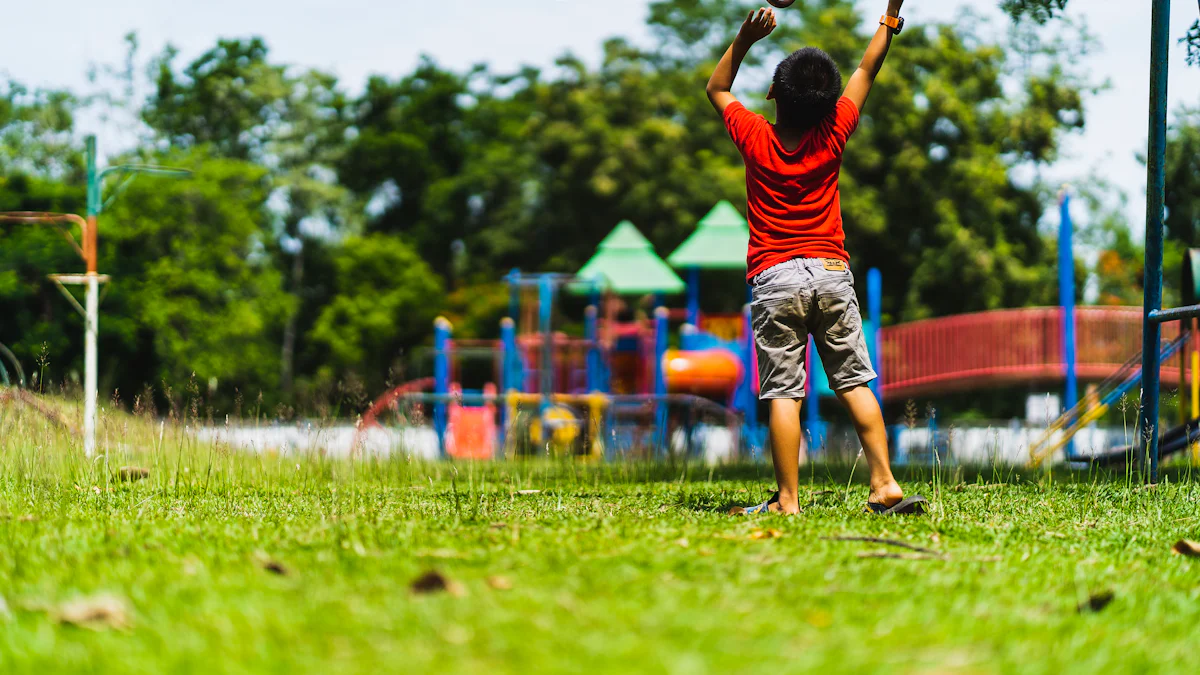Helping Kids Cope with School Stress and Performance Anxiety

School stress and performance anxiety affect many children today. Kids often feel pressure to excel academically. A survey reveals that 61 percent of teens experience significant pressure to achieve good grades. Addressing these issues is crucial for children's mental health. Stress and anxiety can impact well-being, leading to overwhelming emotions. Helping kids manage these feelings promotes a healthier, happier life. Parents and educators play a vital role in supporting children through these challenges. Encouragement and understanding can make a difference.
Understanding School Stress and Performance Anxiety
What is School Stress?
School stress refers to the pressure students feel due to academic demands. Many students experience stress from schoolwork, exams, and expectations. The Pew Survey of Teens on Academic Pressure indicates that 61 percent of teens face significant pressure to achieve good grades. This pressure can lead to overwhelming feelings and impact mental health.
Causes of School Stress
Several factors contribute to school stress. High academic expectations often create pressure. Students may feel stressed about completing assignments on time. Peer pressure can also add to stress levels. Extracurricular activities sometimes increase stress when students struggle to balance them with academics.
Signs and Symptoms in Children
Parents and educators should watch for these signs to provide support.
What is Performance Anxiety?
Performance anxiety involves fear or apprehension about performing tasks. Many students experience this anxiety during exams or presentations. The Pew Survey on Teens' Views on Anxiety and Depression reveals that 70 percent of teens consider anxiety a major problem among peers. Performance anxiety can hinder a child's ability to succeed academically.
Causes of Performance Anxiety
Several factors cause performance anxiety. Fear of failure often triggers anxiety. High expectations from parents or teachers can contribute. Past negative experiences sometimes lead to anxiety. Lack of preparation may increase feelings of anxiety. Understanding these causes helps in addressing the issue effectively.
Signs and Symptoms in Children
Children display various symptoms of performance anxiety. Physical symptoms like sweating or trembling may occur. Some children experience rapid heartbeat or nausea. Avoidance of certain tasks often indicates anxiety. Difficulty concentrating may also be a sign. Recognizing these symptoms allows for timely intervention and support.
Strategies to Help Children Manage Stress and Anxiety

Reinforcing Hard Work Over Results
Effort and persistence play a crucial role in helping kids cope with stress. Kids need to understand that hard work matters more than the final result. Parents and educators should emphasize the value of trying and learning from mistakes. This mindset encourages resilience.
Celebrating small achievements boosts confidence. Recognizing progress, no matter how minor, inspires children to keep going. Acknowledging these victories helps kids feel valued and motivated. This approach reduces performance anxiety and fosters a positive attitude toward challenges.
Giving Children Time to Process Feelings
Open communication is essential for helping kids manage emotions. Encouraging children to express feelings creates a safe environment. Listening without judgment allows kids to share worries and fears. This practice builds trust and strengthens emotional bonds.
Validating children's emotions shows empathy and understanding. Acknowledging feelings helps kids feel heard and respected. This validation reduces anxiety and promotes emotional well-being. Kids learn that emotions are normal and manageable.
Separating Parental Love from Academic Performance
Unconditional support and love reassure children that worth is not tied to grades. Parents must convey that love remains constant regardless of academic success. This assurance alleviates pressure and stress related to school performance.
Building self-esteem and confidence empowers children. Encouraging self-belief helps kids tackle challenges with courage. Confidence grows when children know that effort and character define them. This belief system supports mental health and reduces anxiety.
Kathy Reamy, a school counselor, highlights the immense pressure kids face today. She notes the impact of societal expectations and safety concerns on mental health. This insight underscores the importance of strategies for helping kids navigate stress.
Supporting a Variety of Interests
Encouraging Extracurricular Activities
Diverse interests help kids grow in many ways. Extracurricular activities offer new experiences and skills. Kids can explore music, sports, or art. These activities build confidence and creativity. New challenges teach resilience and adaptability.
Balancing academics and hobbies is essential. Kids need time for both study and fun. A balanced schedule reduces stress. Parents can help by organizing time effectively. Encouragement from adults supports a healthy balance.
Encouraging In-Person Friendships
In-person friendships develop vital social skills. Kids learn communication and empathy through interaction. Friendships teach cooperation and conflict resolution. Social skills gained through friendships last a lifetime.
Building a support network provides emotional strength. Friends offer understanding and encouragement. Kids feel less isolated with a strong network. Support from peers helps manage school stress. Positive relationships contribute to overall well-being.
Helping kids find joy in various interests enriches their lives. Parents and educators play a key role in this journey. Encouragement and support lead to happier, more balanced children.
Maintaining Healthy Habits and Routines
Importance of Sleep and Nutrition
Establishing a Sleep Routine
A consistent sleep routine plays a crucial role in helping kids manage stress. A regular bedtime ensures children get enough rest. Sufficient sleep improves mood and focus. Parents should create a calming bedtime environment. A quiet and dark room promotes better sleep quality. Limiting screen time before bed helps children unwind. Reading or listening to soothing music can also aid relaxation. A well-rested child feels more prepared to face daily challenges.
Promoting Healthy Eating Habits
Nutrition significantly impacts a child's ability to cope with stress. Balanced meals provide essential nutrients for brain function. A diet rich in fruits, vegetables, and whole grains boosts energy levels. Regular meals prevent mood swings and irritability. Parents should involve children in meal planning and preparation. Cooking together encourages healthy eating habits. Nutritious snacks like nuts and yogurt support sustained energy. Proper nutrition helps kids maintain a positive outlook.
Modeling Healthy Coping Strategies
Demonstrating Stress Management Techniques
Parents play a vital role in helping kids learn stress management techniques. Demonstrating techniques like deep breathing can be effective. Deep breaths calm the mind and reduce anxiety. Parents should practice these techniques with children. Engaging in physical activities like yoga or stretching helps release tension. Exercise improves mood and overall well-being. Encouraging children to express their feelings through art or journaling provides an emotional outlet. Creative activities foster resilience.
Encouraging Mindfulness and Relaxation
Mindfulness practices help children stay present and focused. Simple exercises like guided imagery promote relaxation. Parents can guide children through visualization exercises. Imagining peaceful scenes reduces stress and anxiety. Mindfulness apps offer guided sessions for kids. Parents should explore these resources together with children. Relaxation techniques like progressive muscle relaxation ease physical tension. Teaching children to relax supports emotional balance.
Helping kids develop healthy habits and routines empowers them to handle stress effectively. Parents and educators must lead by example. Consistent routines and positive coping strategies build resilience. Children equipped with these tools thrive in challenging situations. A supportive environment nurtures growth and well-being.
Encouraging Physical Activities

Benefits of Physical Exercise
Physical exercise plays a vital role in helping kids manage stress and anxiety. Regular activity reduces stress hormones and boosts endorphins. These natural chemicals enhance mood and create a sense of well-being. Exercise also helps kids focus better on tasks. Improved concentration leads to greater success in school.
Reducing Stress and Anxiety
Exercise provides a healthy outlet for stress. Physical activity releases tension and promotes relaxation. Kids who engage in regular exercise often experience fewer anxiety symptoms. Activities like running, cycling, or playing sports can significantly lower stress levels. Encouraging kids to participate in physical activities fosters resilience and emotional stability.
Improving Mood and Focus
Exercise improves mood by increasing serotonin levels. This neurotransmitter enhances feelings of happiness and satisfaction. Kids who exercise regularly often feel more positive and energized. Physical activity also sharpens focus and attention. Improved concentration helps kids perform better academically. A positive mood and clear mind create a foundation for success.
Incorporating Physical Activities into Daily Routine
Incorporating physical activities into daily routines empowers kids to thrive. Parents and educators can create opportunities for movement throughout the day. Simple activities make a big difference in overall well-being.
Fun and Engaging Activities
Fun activities motivate kids to stay active. Games like tag, jump rope, or dance parties offer enjoyable ways to move. Team sports provide social interaction and teach cooperation. Kids can explore different activities to find what they love. Enjoyment encourages consistent participation and builds lifelong habits.
Setting Realistic Goals
Setting realistic goals helps kids stay motivated. Short-term goals provide a sense of achievement and progress. Celebrating small victories boosts confidence and encourages perseverance. Parents can guide kids in setting achievable targets. Support and encouragement help kids reach their potential.
Helping kids embrace physical activities creates a path to a healthier, happier life. Movement reduces stress and enhances focus. Parents and educators play a crucial role in fostering an active lifestyle. Encouragement and support lead to lasting benefits for children's well-being.
Helping kids cope with school stress and performance anxiety requires practical strategies. Reinforce hard work over results to build resilience. Encourage open communication to validate emotions. Support diverse interests to foster well-rounded growth. Maintain healthy habits for emotional stability. Promote physical activities to reduce stress. Parents and educators must take action. Provide understanding and ongoing support. Create a nurturing environment for children. Address academic and social pressures effectively. Inspire kids to embrace challenges with confidence. Equip children with tools for a balanced life. Empower them to thrive in every situation.
See Also
Guiding Your Child Through Anxiety with Care
Simple Ways to Assist Children in Handling Stress
Revitalize and Support Your Child After a Tough Day
Educate Your Children on the Skill of Self-Soothing
Nurturing Emotional Wellness in Your Children: Self-Care Suggestions

